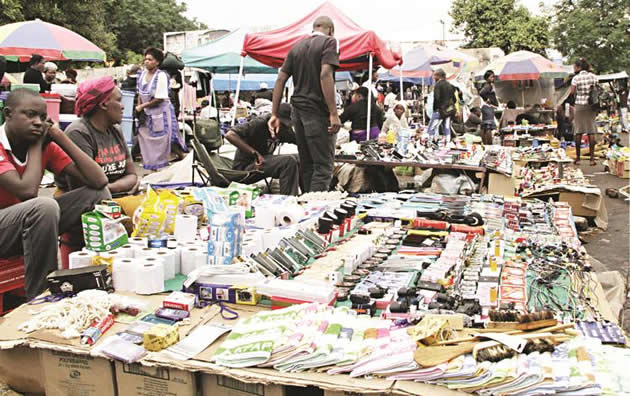BCC allocates 700 vending bays


VENDORS sell their wares along Lobengula Street in Bulawayo yesterday. There has been an increase in the number of vendors of late. Inset: Bulawayo Mayor Martin Moyo
Charity Ruzvidzo Business Reporter
BULAWAYO City Council (BCC) last year allocated more than 700 vending bays to the informal sector in a bid to reduce and ease unemployment as companies continued to close down.
Due to operational constraints facing businesses countrywide, Bulawayo has been hit by massive de-industrialisation in the past few years.
Presenting the 2015 national budget in November last year, Finance and Economic Development Minister Patrick Chinamasa announced that at least 55,000 workers lost their jobs countrywide between 2011 and last year as firms continued to close down.
In his New Year message, the Mayor, Councillor Martin Moyo, said as part of their efforts to reduce and ease unemployment, the local authority last year apportioned 787 vending bays.
“With the increase in the number of factories shutting down resulting in massive unemployment, there was a significant rise in informal activity within the city particularly vending.
“To mitigate against the ailing national economy and high unemployment levels, a total of 787 vending bays were identified and allocated in the city,” he said.
He added: “Thirty formerly closed shops were re-allocated, eight commercial and service industry bays were sold and nine factory shells re- allocated.”
Clr Moyo said plans to provide proper vending marts or shelter to informal traders during the period under review were, however, hampered by a critical shortage of capital.
He urged residents to gear up for development in 2015 on the back of the Zimbabwe Agenda for Sustainable Socio-economic Transformation (Zim-Asset).
Zim-Asset is an economic blueprint to anchor the country’s economy up to 2018 and it seeks to foster economic growth and development.
“The economic and social transformation agenda requires all stakeholders to actively participate in the development of the nation.
“The City of Bulawayo in line with its vision of being a leader in local governance excellence, must pioneer innovations and solutions in local governance and municipal service delivery,” Clr Moyo said.
Last week, Small and Medium Enterprises (SMEs) and Corporative Development Minister Sithembiso Nyoni directed informal sector associations in the city to start registering their members as the government embarks on formalisation of SMEs’ operations in the country.
SMEs operations are being formalised to enhance their contribution to the fiscus considering that they are the engine of the country’s economy.
Of late, it has been noted that Zimbabwe’s SMEs sector is vibrant but most of its operations are not formalised.
According to Minister Nyoni, the informal sector contributes 67 percent of Bulawayo’s revenue.
Following the rapid growth and development of informal activities in the country, players in the sector are experiencing working space shortages.








Comments